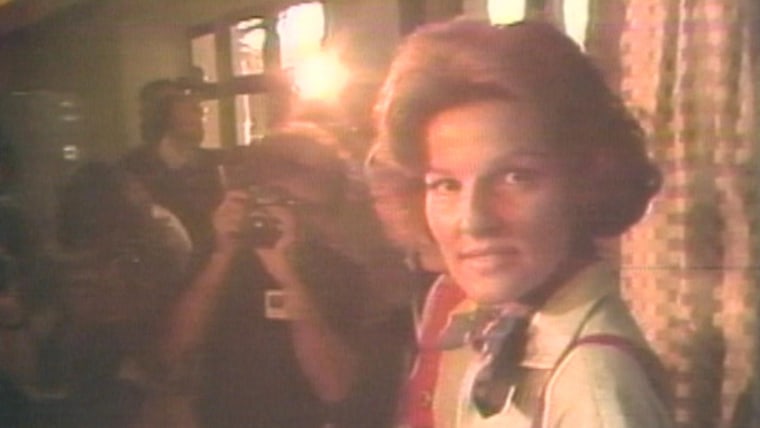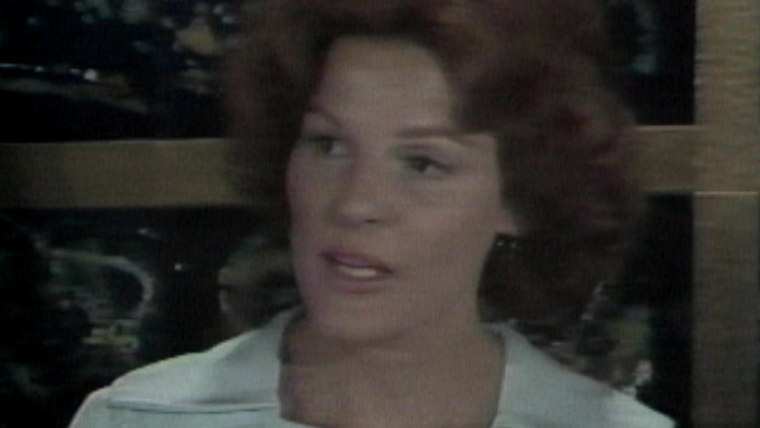At a public hearing in Dade County, Florida, parents were enraged. The nation, they said, was in peril and children were at risk. A recent ordinance had granted gay people housing and employment protections, and that meant teachers couldn’t be fired because of their sexuality. Florida classrooms quickly became a battleground, and opponents of the ordinance said the state’s support of civil rights for homosexuals was infringing on their rights as parents.
Action had to be taken, and a campaign to limit the legal rights of LGBTQ people — all in the name of protecting children — was enacted. A woman who spoke at this hearing said it was her right to control “the moral atmosphere in which my children grow up.” That woman was Anita Bryant, formerly Miss Oklahoma and a white, telegenic, Top 40 singer who was well known for her Florida orange juice commercials (“A day without orange juice is like a day without sunshine!” she’d say). Bryant spearheaded an anti-LGBTQ campaign of such impact that its echoes can be heard in today’s rhetoric. The year was 1977.
Last month, nearly half a century after Bryant’s “Save Our Children” campaign, Florida Gov. Ron DeSantis signed the Parental Rights in Education bill, dubbed the “Don’t Say Gay” bill by its opponents. The measure, which takes effect July 1, prohibits classroom instruction on sexual orientation or gender identity in “kindergarten through grade 3 or in a manner that is not age-appropriate or developmentally appropriate for students in accordance with state standards.” Similar bills are being considered in 19 other states, according to the Movement Advancement Project, an LGBTQ think tank that has been tracking the bills.
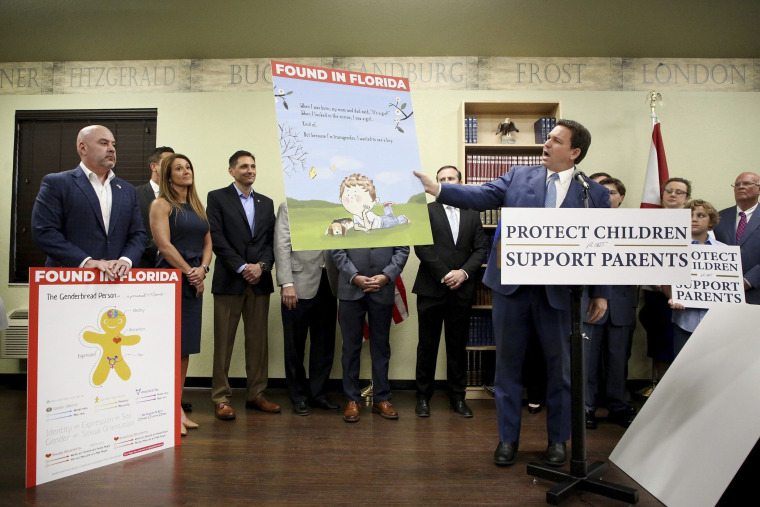
Advocates of Florida’s bill say its purpose is to allow parents to decide how and when LGBTQ topics are introduced to their children. Opponents say it hurts the very children advocates are trying to protect. Sam Ames, director of advocacy and government affairs at The Trevor Project, a queer youth advocacy group, said in a statement that the bill will “erase young LGBTQ students across Florida, forcing many back into the closet by policing their identity and silencing important discussions about the issues they face.”
Historians say they’ve seen this before.
“It’s a contemporary version on these older attempts to annul homosexuality,” said Lillian Faderman, author of “The Gay Revolution,” among other queer history titles.
“In the present environment, you can’t go after homosexual teachers anymore,” Faderman said. “We have too many allies. And so Florida has found another way to do it by this ‘Don’t Say Gay’ bill, which doesn’t go after homosexual teachers precisely. But the idea is the same. That is, that homosexuality is a pariah status, and it shouldn’t be discussed in the public schools.”
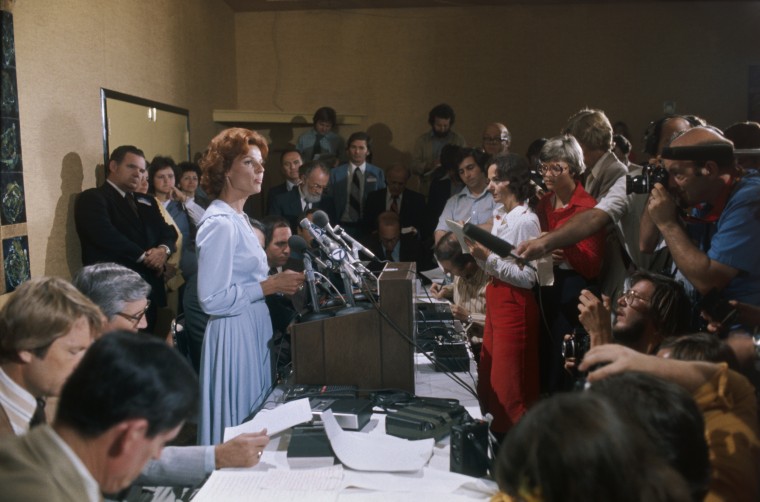
When Bryant began her campaign in 1977, she had four children, and often said she was speaking as a mother and a Christian. And while the villainization of LGBTQ people was not new, Bryant took the idea of protecting children and made it mainstream. Her campaign and the subsequent “Save Our Children” political coalition used the argument that “homosexuals cannot reproduce, so they must recruit. And to freshen their ranks, they must recruit the youth of America.”
Bryant’s focus on the idea that LGBTQ people were threatening to children created a talking point that social conservatives were able to rally around and promote to their friends and neighbors. Bryant paired this with her Christian faith, telling Playboy magazine in 1978 that her position “was not taken out of homophobia, but out of love” for gay people. When a gay activist threw a pie in her face during a news conference, she immediately prayed for the man to be “delivered from his deviant lifestyle.”
“Deviance” was part of Bryant’s core argument that homosexuality was evil and that LGBTQ people didn’t deserve rights. To award them nondiscrimination protection was to offer them a kind of special privilege. If we label homosexuality a civil rights issue, what is to stop “the murderer from shouting ‘murderer rights’”? Bryant wrote in her 1977 book, “The Anita Bryant Story: The Survival of Our Nation’s Families and the Threat of Militant Homosexuality.”
Bryant’s work resulted in the repeal of the Dade County nondiscrimination ordinance, by a more than 2-to-1 margin, in a voter referendum. Its repeal caused a backlash in other states that had passed similar ordinances, and Bryant’s fame grew. She took her message across the country, and for the next three years was named “The Most Admired Woman in America” in Good Housekeeping’s annual poll.
While Bryant fueled the idea that gays were harmful to children, the blueprint for this type of rhetoric had been laid nearly 20 years before, also in the state of Florida.
June 7, 197701:17
The Florida Legislative Investigation Committee (commonly referred to as the Johns Committee, after Charley Johns, its first chairman) was established in 1956, and was born out of opposition to the desegregation of schools and the pursuit of “communists.” The committee first targeted the NAACP but was stopped by the Supreme Court. The committee then turned to investigating alleged communists in Florida schools, but was stopped by the American Association of University Professors. They needed a new target, and in the fall of 1958, the committee began to investigate — and eliminate — LGBTQ people from Florida schools. There was no court and no association to protect them. The committee was well-funded by taxpayer dollars. School principals and university presidents cooperated.
“Charley Johns’s argument was that of, these homosexuals are perverting our youth because they’re teaching our youth in college, and high school, and elementary school, and we have to get rid of them so they won’t turn young people into homosexuals,” Faderman said. From 1958 to 1965, hundreds — if not thousands — of students and teachers were targeted, with many losing their livelihoods.
Though the committee was deterred from its investigation into the NAACP, its roots in opposition to desegregation and its evolution from racist opposition to homophobic oppression is clear, historians say.
“The Christian right really comes together on enforcing segregation in the 1960s. It’s about anti-Black racism; that’s largely where it starts. And they’ve hit on this idea that they’re protecting children and education,” said Hugh Ryan, a historian and author of “When Brooklyn Was Queer.” “They realize that this works, that this is the issue that will create a ‘political moral majority.’”
By the time we get to Anita Bryant in 1977, Ryan said, “they’ve already realized that they can harness this political conservatism and attach it to religion by talking about the family.”
Bryant ‘won the battle’ but lost ‘the war’
Though the Dade County ordinance was repealed, opposition to the bill led to a kind of LGBTQ activism that had not been previously seen in South Florida.
“The thing to remember is that Anita Bryant won that battle initially, but she did not win that war,” said the historian Julio Capó Jr., a native Floridian, who wrote “Welcome to Fairyland: Queer Miami Before 1940.”
He said Bryant inadvertently spurred a mobilization and a movement.
“It was transformative,” Capó said. “It got people to see themselves as a voting bloc. It got them to see that their very existence and their rights were very much under attack in a different way than we had seen in the decade prior.”
June 8, 197701:18
The activism spread from Dade County and across the country, pushing against Bryant’s own “Christian crusade,” as she called it. In 1977, the co-executive directors of the National Gay Task Force wrote a thank you in The New York Times to Bryant and her Save Our Children organization, saying they were “doing the 20 million lesbians and gay men in America an enormous favor: They are focusing for the public the nature of the prejudice and discrimination we face.”
Though Bryant did enjoy some additional years of fame, her anti-gay rhetoric ultimately caused her career prospects to plummet. Her booking agent dropped her, the Florida Citrus Commission stopped running her orange juice ads and she filed for bankruptcy — twice. The anti-discrimination ordinance she helped repeal in 1977 was restored in 1998.
And today, even though state legislators continue to chip away at LGBTQ rights, same-sex marriage is legal across the country and federal law prohibits anti-LGBTQ discrimination in the workplace.
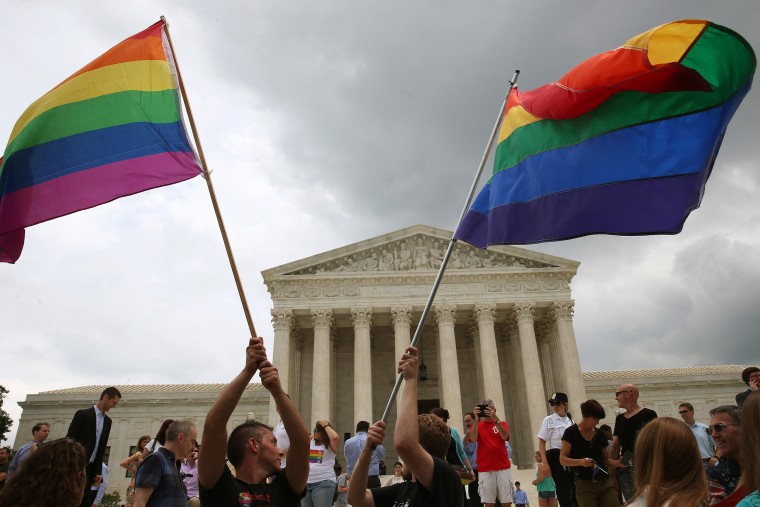
Though the times have changed significantly since Bryant’s heyday in the late ‘70s, it appears her views have not. In 2021, Bryant’s granddaughter Sarah Green told Slate that she came out to her grandmother on her 21st birthday. Bryant reportedly responded by saying homosexuality isn’t real.
“It’s very hard to argue with someone who thinks that an integral part of your identity is just an evil delusion,” Green said. Green, who clarified to them.us that she is bisexual, told Slate about her upcoming wedding to her fiancée, a woman, and said she wasn’t sure if her grandmother would be attending.
“I just kind of feel bad for her,” Green added. “And I think as much as she hopes that I will figure things out and come back to God, I kind of hope that she’ll figure things out.”
Bryant, now 82, no longer lives in Florida. She returned to her home state of Oklahoma and runs Anita Bryant Ministries International. Neither Bryant nor Green responded to requests for comment.
Follow NBC Out on Twitter, Facebook & Instagram

